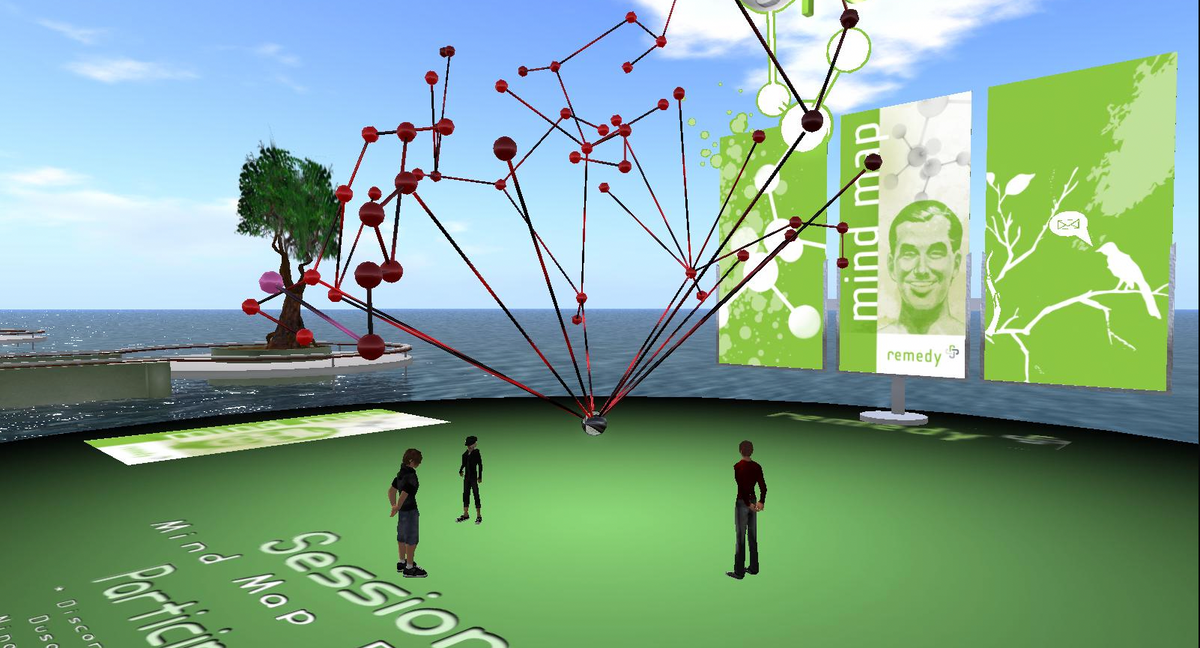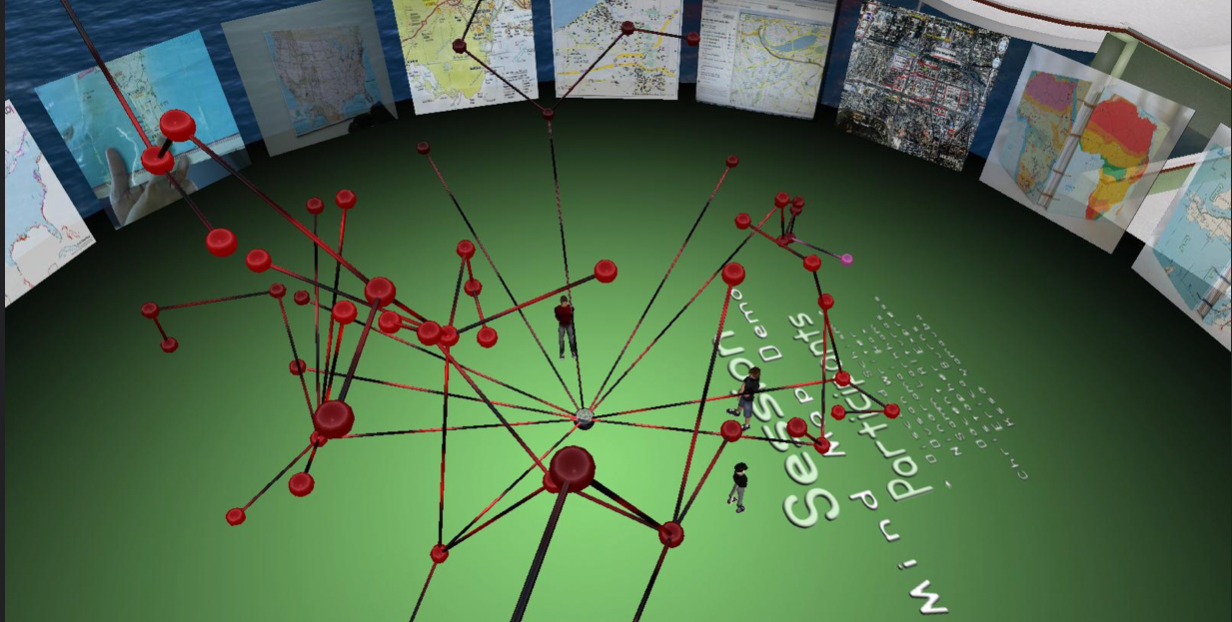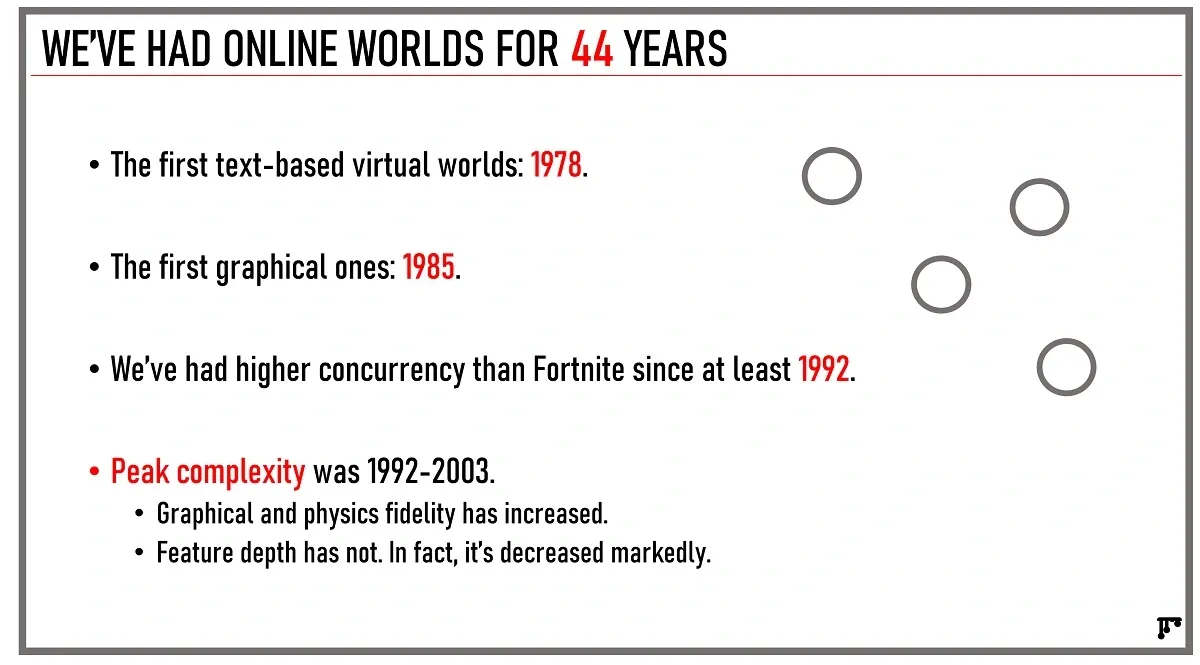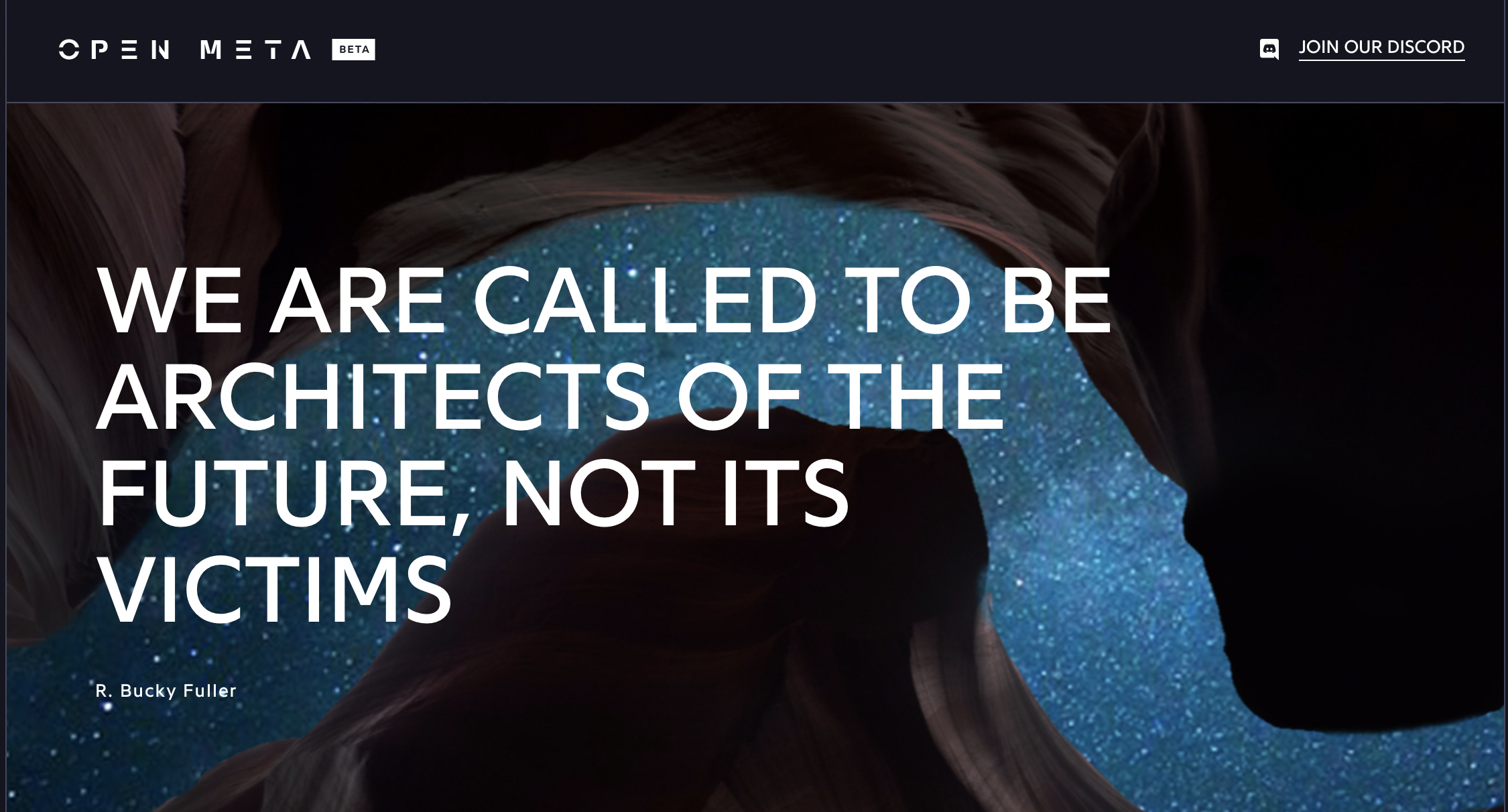A Metaverse of DAOs
DAOs represent composable structures for human creativity and culture. Like NFTs they will be a cornerstone to parts of the Metaverse. But DAOs are still a bet on whether people, passion and code can play well together.

In 2008 we created a 3D mind map. The idea was that it would let small communities share concepts in both a shared virtual space and asynchronously.
It had a few clever features: as the branches expanded, for example, parts of the tree would 'fall off' leaving only the most robust concepts behind. Nodes could also auto-generate web searches which appeared on the walls around you - a clever way to 'feed' the ideation process.

But the execution was tricky in part because it required a skill with your camera that most users didn't have and in part because it was counter-intuitive to create a 3D map when a simple text one would do.
Later, however, we extended the mind map to include 3D models. The nodes became 3D architectural sketches and you could easily follow and comment on design choices as they evolved along branches of the tree.
Today, that's what Omniverse is for and it's a multi-billion dollar platform. Back then, it was hacked together by three of us and was based on a concept called Wikitecture.
We ended up using it to help a financial company design their branches. You can still see the results today when you walk into the locations of a major US bank.
Ideas As Composable Assets
It's 14 years now since that first mind map. And on the surface it was "just" a fancy white board. (Although at the time it was pretty radical based on where the tools were at).
But it spoke to my deep fascination with concepts that included co-presence, collaboration on 3D assets, spatial awareness and its impact on creativity and the ability to smoothly transition between synchronous and asynchronous collaboration.
Even more profound was the idea of composability.
Today, composability is the lifeblood of the Internet. At the time there was no React or GraphQL, APIs hadn't been fully 'groked' as the way that the web would work, and we were certainly a long way from no-code development.
In laymans terms, today's Web is built up of a lot of modular little pieces. Many of those pieces play nicely together. It's how you can see a weather feed from another service on the news page you're reading, it's how it makes it possible to easily embed a Tweet in a blog post, and it's how Facebook is able to track you around sites that don't even seem connected.
The mind map was an extension of my deep fascination with "prims" and their composability. A script written by one person could be embedded in the model of a car created by another which could be "coloured" with textures created by a third.

Throw in a licensing scheme where ownership, rights and dollar values could be passed along with each composable atom and an entire world could be built from the ground up.
As @Dusanwriter pointed out, Second Life had 'NFTs' from the start. As this image shows, I can create a digital atom that can be sold/transferred/mixed by others, with attribution. pic.twitter.com/p9Je77H7c7
— Philip Rosedale (@philiprosedale) July 7, 2021
Interoperability and Ideas
Add in the fact that those prims were interoperable across multiple worlds (with some footnotes about how their commercial value was never interoperable) and we had the makings of a fully open Metaverse.
But even at the time 'interoperability' seemed to me like something bigger than being able to bring a pair of shoes from one world to another, or your avatar, or even, at a rough level, your identity (no need to sign-up for 100 different services, you could just travel where you wanted).
In fact, the challenge of interoperability wasn't primarily technical. As Raph Koster pointed out this week in his presentation at the Games Beat summit, the challenge of interoperability is mostly social and financial. We've had interoperability for a long, long time.

(As a side note: I deeply disagree with Raph's current stance on the Metaverse, but that's a topic for another post. He's a god to me...but lately I feel he might be too encumbered by his own experience).
Our mind map, in fact, had limitations beyond technical ones.
It demonstrated that "prims" could be used to encapsulate ideas. They could be powerful engines for collaboration, community, co-creation and storytelling.
And while the prims themselves (the nodes, the text, the 3D models) might be interoperable, there was no infrastructure to codify the ideas that they represented.
It would take more than a decade for the infrastructure to catch up to our wild dreams.
Understanding DAOs and Composability
I'm not an expert on decentralized autonomous organizations (DAOs).
Honestly, the name leaves me a bit cold. And 99% of DAOs aren't even autonomous.
But I arrived at DAOs in a similar way to NFTs.
They triggered pattern recognition. Some dormant part of my brain lit up because once I scraped away the hype and speculation, the misinformation and the false equivalencies, I sensed something akin to the composability of ideas and stories that I had been pursuing a decade ago.
What is a DAO? The Simple Version
But let's pause for a minute and get on the same page. Or...let's get on MY page. Because, not being an expert at this, I can only give you the lens I use to understand what a DAO is. (And please...I know this is a vast over-simplification but here it is).
First, the blockchain:
- The blockchain is NOT money. It's software. It's just technology. (Remember the turtles).
- As software, it's programmable. Think of how you log-in to a website: you put in your name and password and the system "allows" you in. The blockchain is similar: one person makes a request, and the system "allows" you to fill that request.
- One way of thinking about those requests is that there are tiny little contracts built into the software. "If USER A has permission B, let them do C"
- One nice thing about all of these little contracts? Everyone can see them. No one controls them. There's no central body that can muck things up.
A DAO is a bunch of mini contracts:
A DAO is a bunch of little contracts. In theory, it doesn't need any people. That's the autonomous part. In practice, however, people "join" the DAO because they like the look of those little contracts.
Those contracts are bits of code. Those contracts are composable. And some of those contracts can include provisions that require the actions of participants of the DAO.
Think again about the 3D mind map above. It was a very rudimentary DAO:
- It was just code. It didn't have any magic of its own. It couldn't design a new bank branch. The code was as good as the people using it.
- It had permissions. Only "members" could add nodes the mind map.
- It had decision points. These were programmatic but based on user input. In other words, if enough people voted to turn a bank branch into a tree house, other branches would automatically fall away.
What it didn't have was:
- Authority over the purse. That was up to the VP of bank branches to decide where to put his cash.
- The ability to easily combine with other systems. It was composable within its own system, but it didn't "talk" well with others.
- The ability to change its rules. Sure, we could have programmed this in. But there was no system of 'governance' over the code itself. In other words, we were the centralized repository of how the rules worked and we controlled who changed the code ('contracts').
A More Open Metaverse
So, I'm more deeply immersed in DAOs lately because of my work with the Open Meta DAO.
And I should say right off the top that I was attracted because of the "Open Meta" part...not the DAO part.

And this is a key point.
If you think a DAO is simply a structure, a new way to organize a 'corporation', then you're missing the broader point:
- A DAO is a set of composable contracts
- That can include interactions with people
- Who may or may not be aligned to a shared mission and vision
There are already DAOs for having dinner with friends. There was a DAO whose sole purpose was to buy a copy of the US Constitution.
In the first instance, you won't join the DAO unless you actually want to have dinner with those friends. And in the second, you won't join if you're not interested in the shared vision of owning a copy of the Constitution.
I was attracted to Open Meta because of the people and the purpose. The DAO is a container within which they can "compose" aspects of the open Metaverse. That ability to compose is backed by a series of contracts, and I tend to think the contracts are solidly constructed.
But in the end it's a bet on people and purpose.
Is it the smart bet? I'm not sure.
Maybe the corporate model is there for a reason.
But as I said yesterday, I've chosen my turtle, and I chose it in part because I think today's economic systems are broken, our planet is in pain, and it's time to try something new.
A Metaverse of DAOs
But let's look forward a bit.
Today, DAOs are too new. There can be incredible friction to joining a DAO. The contracts that govern DAOs are still being perfected. And yes, there are rug pulls and scams, poorly thought-out models and DAOs that are filled with speculators instead of builders.
There are also absolutists. I'm not one of them. It might make sense to turn a condo association into a DAO, or to turn my guild into a DAO to remove decision-making ambiguity.
But that doesn't mean everything should be "on-chain".
Similarly, the Metaverse does NOT rely solely on web3 to be actualized. It's emerging in all kinds of ways. And that's great. (Well, it's great so long as it doesn't trend towards dystopia, surveillance and addiction...which is partly why I'm so deeply passionate about an open Metaverse).
But with that set aside, DAOs are an important component of the Metaverse because they, along with NFTs, allow us to create new forms of social organization and culture:
- Imagine your avatar "containing" DAO contracts, so that as you move from world to world, your preferences for privacy are respected
- Imagine being part of mini DAOs devoted to a specific game or game guild, and that your interests (and inventory) was protected and not subject to the whims of some game studio somewhere
- Imagine that it isn't just your inventory that is transportable from one world to another but also your ideas, your backstory, your reputation. Imagine that your DAO memberships unlock collaboration opportunities when you visit different places
DAOs may become the equivalent of...dunno, Javascript or something. Little mini forms of organization, a cluster of beliefs, a shared sense of purpose - expressed in code in a way that makes it easier to organize, to build, to make a living, to expand our capacity to be human.
The technology won't do it for us. It's just technology.
But the tools that are emerging today feel to me like an important piece of infrastructure that was missing a decade ago.
Because today we can come together and create new mind maps. We can code some little piece of composable story and use it to tell a larger narrative. We can create a wiki or a piece of avatar fashion. We can join a book club or an environmental group.
And we can do so in a way where our efforts aren't just swallowed up by the centralized silos that want to monetize our data.
Instead, the work we do can be another atom that makes up a better, more chaotic, more creative and more sustaining world.
Bring on the DAOs. Let's see what they can do.
So...I'd really like to hear from you. If you get this by e-mail, please do reply. I love it when people hit reply.
You can also hit me up on Twitter. I like having chats in the public square when I can.
Please do join the Open Meta Discord (if Discord is your thing).
And if you want something REALLY fun, join me as I explore something that I've been spending a lot of time on. Like, decades. :)